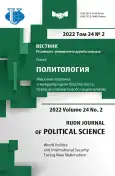Ethno-Regional Parties in the European Parliament: The Unevident Political Actor
- Autores: Eremina N.V.1
-
Afiliações:
- Saint-Petersburg State University
- Edição: Volume 24, Nº 2 (2022): World Politics and International Security Facing New Nationalism
- Páginas: 303-316
- Seção: REGIONAL ETHNO-NATIONALISM: CONFLICT AND COALITION POTENTIAL
- URL: https://journal-vniispk.ru/2313-1438/article/view/322631
- DOI: https://doi.org/10.22363/2313-1438-2022-24-2-303-316
- ID: 322631
Citar
Texto integral
Resumo
Ethno-regional parties play a vital role in the conflict between the center and the ethnic regions, which is relevant for all modern multiethnic EU states. The European integration allows these parties to participate in the regional policy of the EU (contributing to the decentralizing reforms in the member states), as well as to interact within Euroregions and on communitarian platforms, such as the European Parliament. This article aims to clarify if this ethno-regionalist faction is able to influence the integration processes in Europe, and to what extent. To achieve this goal, we need to answer the following questions: how can the ethno-regionalists be described from a theoretical point of view? What is the dynamic of their development within the European Parliament, considering the historical retrospective? What are their current ideological attitudes that allow them to maintain unity and achieve success? The article is based on the author’s concept of cultural-territorial differentiations, which points the correlation between the political ethno-regional movement and the existing ethnocultural features and historical territory. The author concludes that it was Europeanization that led to the strengthening of the ethno-regional movement in Europe as it made the question of the ethno-regional collective response relevant. Therefore, ethno-regionalists are an essential element of every political system at the national and supranational levels. At the same time, the historical evolution and experience of European regionalists prove that they cannot constitute an independent and autonomous political force at the supranational level as their cooperation depends on various legal and political circumstances occurring on the state level.
Sobre autores
Natalia Eremina
Saint-Petersburg State University
Autor responsável pela correspondência
Email: nerem78@mail.ru
ORCID ID: 0000-0002-1349-8659
Professor of Department of International Relations
Saint-Petersburg, Russian FederationBibliografia
- Eremina, N. V., & Khudoley, K. K. (2017). Brexit: the new “old” choice of Great Britain. Sovremennaja Evropa, 3(75), 28–36. (In Russian).
- Eremina, N. V. (2017). Roots of Brexit: Conflict of Identities in the United Kingdom. Contours of global transformation: politics, economy, legislation,10(1), 87–105. (In Russian).
- Oskolkov, P. (2021). Ethno-regionalist parties of the EU: the phenomenon of the “European Free Alliance”. Sovremennaja Evropa, 1(101), 141–142. (In Russian).
- Amaral, J. (2021). Civil Society in Peace Referendums: Inclusion and Campaign Mobilization in Northern Ireland and Cyprus. Nationalism and Ethnic Politics, 27(3), 370–388.
- Asari, E.-M., Halikiopoulou, D., & Mock, S. (2008). British National Identity and the Dilemmas of Multiculturalism. Nationalism and Ethnic Politics, 14(1), 1–28.
- Elias, A., Basile, L., Franco-Guillén, N., & Szöcsik, E. (2021) The Framing Territorial Demands (FraTerr) dataset: A novel approach to conceptualizing and measuring regionalist actors’ territorial strategies. Regional and Federal Studies, 1–16. https://doi.org/10.1080/13597566.2021.1964481
- Ferreira, C. (2021). Entrapped in a failing course of action: Explaining the territorial crisis in 2017 Catalonia. Regional & Federal Studies, 1–20. https://doi.org/10.1080/13597566.2021.1907570
- Giraudy, F., & Niedzwiecki, S. (2021). Multi-level governance and subnational research: Similarities, differences, and knowledge accumulation in the study of territorial politics. Regional and Federal Studies, 1–19. https://doi.org/10.1080/13597566.2021.1941900
- Graziano, P. R. & Vink, M. P. (2013). Europeanization: Concept, theory and methods. In The Member States of the European Union (pp. 32–54). Oxford: Oxford University Press.
- Guelke, A. (2019). Northern Ireland, Brexit, and the Interpretation of Self-Determination. Nationalism and Ethnic Politics, 25(4), 383–399.
- Keating, M. (1998). The New Regionalism in Western Europe. Territorial Restructuring and Political Change. London: Cheltenham.
- Keating, M. (2004). European Integration and the Nationalities Question. Politics and Society, 31(1), 1–22.
- Ladrech, R. (2009). Europeanization and political parties. Living Reviews in European Governance, 4(1). http://www.europeangovernance-livingreviews.org/Articles/lreg-2009-1/
- Lecours, A. (2020). The two Québec Independence Referendums: Political Strategies and International Relations. In R. D. Griffits, & D. Muro (Eds.), Strategies of Secession and Counter-Secession (pp. 143–160). London: ECPR Press.
- Lynch, P. (2007). Organizing of a Europe of the Regions: The European Free Alliance-DPPE and Political Representation in the European Union. https://aei.pitt.edu/7954/1/lynch-p-11e.pdf
- Mair, P. (2000). The limited impact of Europe on national party systems. West European Politics, 23, 21–57.
- Massetti, E. (2021). The European Union and the challenge of ‘independence in Europe’: Straddling between (formal) neutrality and (actual) support for member-states’ territorial integrity.
- Regional and Federal Studies, 1-24. https://doi.org/ 10.1080/13597566.2021.1967326
- Platt, L., & Nandi, A. (2020). Ethnic diversity in the UK: new opportunities and changing constraints. Journal of Ethnic and Migration Studies, 46(5), 839–856.
- Reilly, B. (2021). Cross-Ethnic Voting: An Index of Centripetal Electoral Systems Government and Opposition. International Journal of Comparative Politics, 56(3), 465–484. https://doi.org/10.1017/gov.2019.36
- Shair-Rosenfield, S. (2021). Shared rule as a signal of central state commitment to regional selfrule. Regional and Federal Studies, 1-18. https://doi.org/10.1080/13597566.2021.1960512
- Strmiska, M. (2003). Conceptualization and typology of European regional parties: a note on methodology. Central European Political Studies Review, 5(2–3). https://journals.muni.cz/cepsr/article/view/3940/5311
- Valbruzzi, M., & Vignati, R. (2021). Italian regions turn fifty. A new typology of regional party systems in Italy, 1970–2020. Contemporary Italian Politics, 13(4), 462–484. https://doi.org/10.1080/23248823.2021.1983931
- Winter de, L. (2001). The Impact of European Integration on Ethnoregionalist Parties. Working Papers, 195, 1–20.
- Winter De, L. (2002). European Integration and Ethnoregionalist Parties. Party Politics, 8(4), 483–485.
Arquivos suplementares









